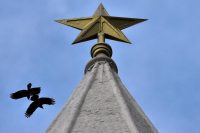Russian Banks, Lies and Emojis
If you were a young iPhone-carrying client of RocketBank, a Russian start-up that offers app-based banking, you would have gotten some mixed messages on Thursday, Jan. 28. At 1:10 p.m., you would have received a letter written in RocketBank’s trademark pally style, only worrisome, and accompanied by a “shruggie” emoji:
“Hi [client’s first name], our longtime partner Commercial Bank Intercommerz is having cash-flow issues. Technically, that doesn’t necessarily mean that you would have problems with RocketBank cards serviced by Intercommerz, but times being anxious as they are, we would like to warn you as soon as we can and help you take precautions.”… Seguir leyendo »



